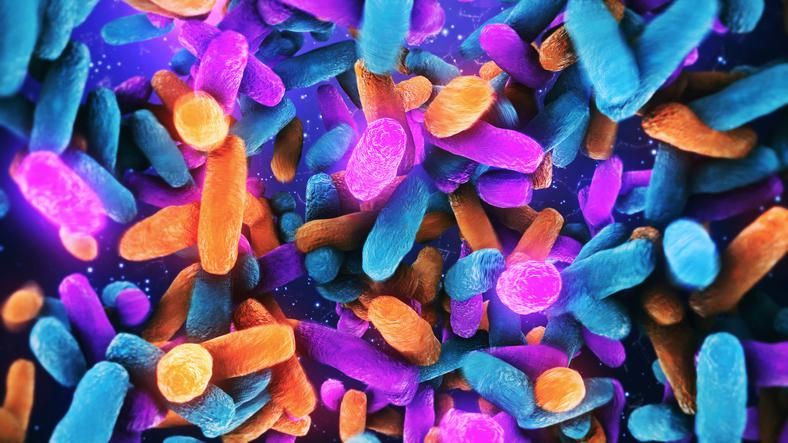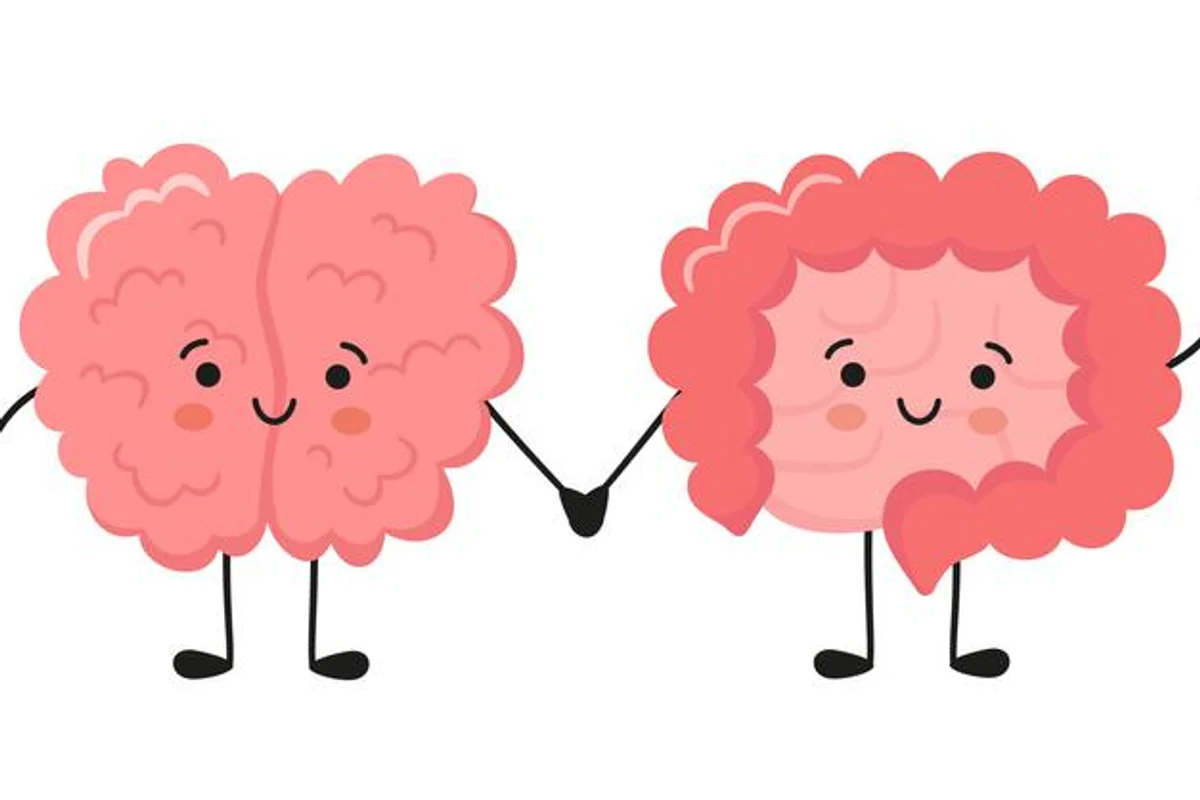Have you ever had to do a presentation or a big test and felt butterflies in your stomach? Did you wonder why the stress was causing stomach pains? You can thank a little-known nervous system in your gut for that.
Most of us have heard of the central nervous system (CNS), which is made of your brain and spinal cord, but there’s another nervous system, too, that you may not have heard of: the enteric nervous system (ENS). The ENS contains a hundred million nerve cells that line the gut, going from the esophagus through the stomach and intestines, all the way through to our rectum. And studies show a link between these two systems. The ENS and CNS send signals back and forth to influence our gut and brain health. As a result, disturbances in our gut can lead to problems with mood and cognition. And issues with our brain, such as mood disorders, can cause abdominal pain.
“The ENS is like our second brain, and it works together with the CNS,” said Dr. Mashal Batheja, an assistant professor of medicine in gastroenterology at Mayo Clinic. “The ENS can also work independently of the CNS. The ENS helps manage how quickly food and water move through the gut. The ENS also communicates with the millions of immune cells in our gut. It helps regulate our digestive gut health.”
“The ENS tells the CNS when we are full and then we stop eating,” Batheja added. “And stress signals can be sent from the brain to the gut, sometimes resulting in pain.”
The ENS and CNS are connected by the vagus nerve, which sends signals back and forth between the brain and the gut. And both systems produce chemicals called neurotransmitters, which send messages throughout your body that help it perform a variety of functions. Many people already know the brain produces a neurotransmitter called serotonin, which gives people feelings of happiness, but what they may not realize is that 90% of our body’s serotonin is actually produced in the gut.
Another neurotransmitter called gamma-aminobutyric acid (GABA), which helps us control feelings of fear and anxiety, is also produced in the gut (as well as the brain).
The microbiome’s role
The microbiome is the balance of bacteria and other organisms in our gut, and it influences all aspects of human health and disease, according to Dr. Jay Pasricha, director of the Johns Hopkins Center for Neurogastroenterology.
“The microbiome has been implicated in all aspects of human health and disease,” Pasricha said. “The microbiome influences the signals our gut sends to the brain and other organs. It produces factors that stimulate the lining of the gut in ways to influence the brain.”
Why does the microbiome have such an impact on our overall well-being? According to Dr. Meredith Wicklund, a neurologist at Mayo Clinic, “The microbiome creates different metabolites and neurotransmitters like serotonin and GABA that send signals to the brain and affect how the brain is functioning. It affects mental health, and it is bidirectional in that anxiety can change the composition of the microbiome, and certain GI symptoms can lead to anxiety.”

The gut, functional disorders and your mood
While some of us just have mild stomach pains during stressful times, others experience severe abdominal pain or gastrointestinal issues, even when no structural problem can be identified on scans or by blood tests. These are called functional bowel problems, and anywhere from 35% to 70% of us have them. One example of a functional bowel problem is irritable bowel syndrome (IBS), and this may be explained by the fact that people with IBS tend to have reduced vagus nerve function.
“Functional disorders like IBS have no obvious structural cause and are associated with a high frequency of anxiety and depression,” Pasricha said.
“And it’s true that the brain can inhibit your gut function,” he added. “But it’s also true that disorders of the gut itself can generate these mood disorders. We’ve shown, for example, if you irritate the stomach in mice, later they will show [signs] of anxiety and depression. And if you cut the vagus nerve, you can reverse this anxiety and depression.”
A few studies suggest that some aspects of anxiety and depression can originate in the gut in humans as well.

The connection between the gut and cognitive health
Our gut health doesn’t just influence our mood, it can also affect our cognitive health, which can play a role in many conditions, including dementia, Alzheimer’s disease, Parkinson’s disease and autism spectrum disorder (ASD).
Several studies have shown an association between the microbiota in our gut and cognitive function. Although the exact reasons why are not yet known, scientists think some chemicals that are made in the gut, called short chain fatty acids, play a role in keeping our brains healthy. In fact, animals who were given one of these short chain fatty acids, called butyrate, developed some protection against vascular dementia. Short chain fatty acids also play a role in the progression of Alzheimer’s disease.
The diversity of the microbiota in your gut also affects memory. Evidence suggests that animals with less diversity in their microbiome, which can be caused by treatment with antibiotics, tend to have reduced memory and impaired working memory.
Similarly, there is evidence from mouse studies showing that a protein that is thought to contribute to the development of Parkinson’s originates in the gut and travels to the brain via the vagus nerve, Pasricha explained.
Additionally, it’s been found that the makeup of gut microbiota in mice with behaviors that are similar to those seen in people with ASD are different from those who don’t exhibit those behaviors. This is interesting when you note that people with ASD have a higher than average rate of gastrointestinal issues.
How can we improve our gut health?
Since our gut plays such an important role in our health, it’s good news that there are steps you can take to improve your gut health. Diet, exercise and sleep all affect your microbiome. Eating a balanced diet, particularly one that has plenty of fiber, is important for a healthy gut.
“When we have a rich diversity of microorganisms in the gut, it tends to be associated with better mood and brain health,” Batheja said. “A lot of probiotic organisms rely on carbs and fibers. We need to feed that good bacteria with good food. Try a plant-based diet, with a wide array of fruits and vegetables. Consider the Mediterranean diet and avoid red meat.”
Exercise is also important to gut health. In fact, moderate exercise can help improve the diversity of bacteria in your gut and the microbial metabolites produced in your gastrointestinal tract. Batheja added that exercise can boost important hormones such as serotonin and dopamine.
Maintaining a healthy lifestyle with a balanced diet, exercise and good sleep habits can help us keep our microbiome in check and that, in turn, may help improve our mood and overall brain health.
More on HealthyWomen
What you need to know about IBS
The wonderful world of your microbiome
- 15 Minutes With Dr. Sanjay Gupta - HealthyWomen ›
- A healthy microbiome builds a strong immune system that could ... ›
- 7 Foods That Help You De-Stress - HealthyWomen ›
- Can Stress Cause Diarrhea? - HealthyWomen ›
- 10 Signs You Have a Leaky Gut—and How to Heal It - HealthyWomen ›
- When It Comes to Your Microbiome, More Germs Are Better - HealthyWomen ›
- A Healthy Microbiome Builds a Strong Immune System That Could Help Defeat Covid-19 - HealthyWomen ›
- 10 Signs You Have a Leaky Gut—and How to Heal It - HealthyWomen ›







